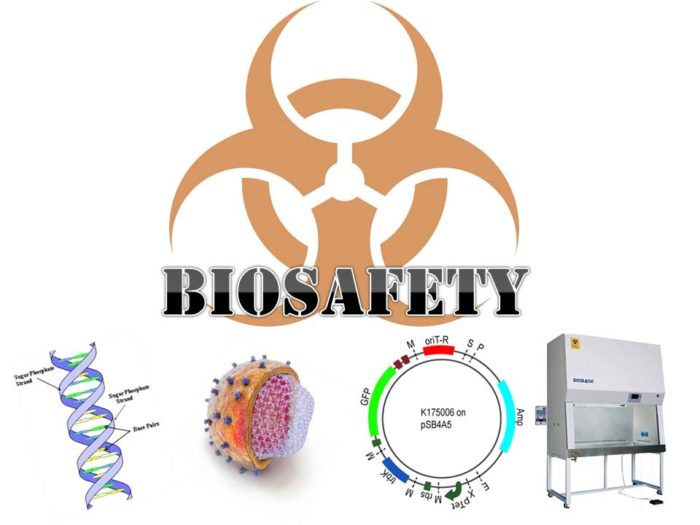[ad_1]

By Okeoghene Akubuike
In a bid to prepare the staff of the National Biosafety Management Agency (NBMA) for its new mandate of biosecurity concept, those in the Department of Biosecurity have been trained on the concept.
Dr Rufus Ebegba, the Director-General, NBMA made this known in an interview with the News Agency of Nigeria (NAN) after the training on Basic Biosecurity Concepts organised for members of the Biosecurity Department of the agency in Abuja.
NAN recalls that President Muhammadu Buhari assented to the NBMA Amendment Act in 2019 which expanded the scope of the agency to include emerging aspects of modern biotechnology and biosecurity.
Ebegba said the aim of the training was to strengthen the capacity of staff of the department in the area of biosecurity.
“The biosecurity training is an induction course for the staff of the department basically aimed at strengthening their capacity.
“This is a new mandate that has been given to the agency; that is the issue of ensuring biosecurity to humans and the environment.
“The essence of this training is to introduce them to the basic principles of biosecurity and to create their consciousness and for them to also make personal effort to strengthen their capacity.”
The D-G said biosecurity was important from the point of human safety and the environment because of the likelihood of people who might want to steal biological agents from facilities and laboratories to cause adverse impact on humans and the environment.
“We are also looking at it from the point of the possibility of adverting biological warfare using biological agents as a military tool to attack countries.’’
He said that biological agents could also be maliciously used to cause trade wars, particularly when some individuals were prone to using biological agents to cause problem in international trade.
“For instance, discrediting the agricultural products of a particular country from being marketable in the international markets is an issue of biosecurity.
“So the issue of trade wars could also arise through the malicious use of harmful biological agents.”
On plans to develop the biosecurity sector, he said the agency would hold a consultative meeting with relevant ministries and agencies on Jan. 24 to carry them along.
Ebegba said the meeting was aimed at establishing what was on ground as they relate to biosecurity, how to build on them and what should be done to harmonise them.
He said the move had become necessary in order to have a national biosecurity policy, a national biosecurity emergency response strategy and to identify the likely biological agents that could cause harm.
Ebegba said that it was also necessary so that “we really know how to assign responsibility to ministries and agencies of government and their level of involvement.”
He said that stakeholders expected at the meeting include the Armed Forces, the Police, Interpol, Representatives from the National Security Advisers Office, Secretary to the Government Office, Ministry of Health, Nigerian Agricultural Quarantine Service, National Centre for Disease Control, among others.
“We have invited them so they will tell us what they are doing and to discuss how we can have a national system in the area of biosecurity.’’
The biosafety boss said it was the agency’s responsibility as a regulatory body to assure Nigerians that whatever GMO that the agency considered safe was indeed safe.
Ebegba said that Nigerians should trust the judgment of the agency and embrace such products without having any doubt or fear.
The facilitator at the training, Dr Stella Udo, the Vice-President, Nigerian Biological Safety Association said biosecurity could not be isolated from biosafety because they worked together.
Udo, also Director of Planning Research and Statistics, Medical Laboratory Science Council of Nigeria explained that bio-risk management was a combination of the biosecurity and biosafety because safety and security worked hand in hand.
“When you are looking at GMOs and other pathogenic organisms, you have to also look at the safety of the people that do manipulate the genes.
“You also look at the security of the agents and organisms themselves because someone who does not mean well might steal it and misuse it.”
Commenting on Nigeria’s readiness in the area of biosafety and biosecurity, she said Nigeria was ready to take baby steps to catch up with the rest of the world.
“The agencies have gotten their mandate that includes biosecurity and biosafety, trainings are going on, people are getting the awareness and implementation of policies and guidelines are ongoing.
“So as a country, I believe at any point in time we decide to take baby steps as we are doing now, it means we are ready.”
She advised Nigerians to embrace the use of GMOs, saying the government meant well by ensuring proper regulation.
Udo said GMOs had various benefits when applied, which include better yield in terms of agriculture, drug manufacturing, vaccines and therapy that would cure certain diseases like cancers.
She said all the regulators needed to do was to make sure that those who do not mean well do not create chaos in system.
“There world is moving on in so many areas where biotechnology can be applied and we cannot sit back and say no.
“Countries now are looking for food and you need to apply GMO now to agriculture for better yield. We cannot go back to the Stone Age but the area of regulation is where the emphasis should be made and not to get up and castigate the technology.”(NAN)
[ad_2]
Source link
Dear readers, we really need your support to keep on serving you with authoritative, truthful, and juicy stories everyday. For your support, please reach out to the editor @gavelinternational66@gmail.com

